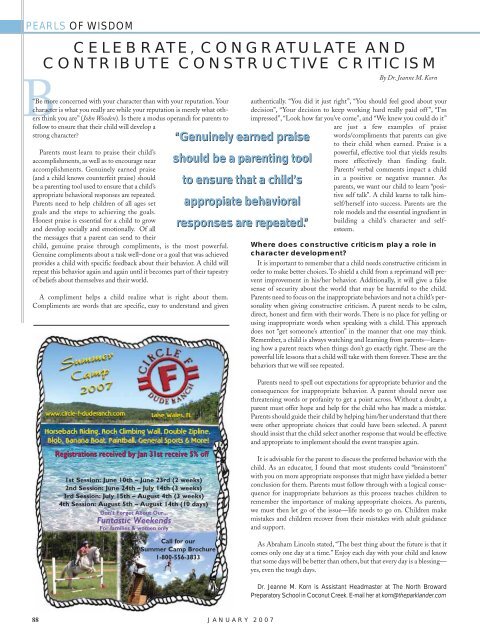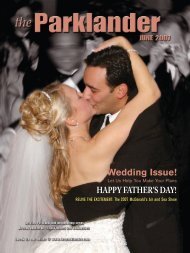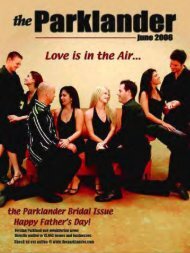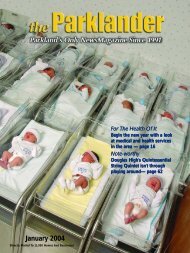Have a Happy & Healthy New Year! - the Parklander
Have a Happy & Healthy New Year! - the Parklander
Have a Happy & Healthy New Year! - the Parklander
You also want an ePaper? Increase the reach of your titles
YUMPU automatically turns print PDFs into web optimized ePapers that Google loves.
PEARLS OF WISDOM<br />
CELEBRATE, CONGRATULATE AND<br />
CONTRIBUTE CONSTRUCTIVE CRITICISM<br />
B“Be more concerned with your character than with your reputation. Your<br />
character is what you really are while your reputation is merely what o<strong>the</strong>rs<br />
think you are” (John Wooden). Is <strong>the</strong>re a modus operandi for parents to<br />
follow to ensure that <strong>the</strong>ir child will develop a<br />
strong character?<br />
Parents must learn to praise <strong>the</strong>ir child’s<br />
accomplishments, as well as to encourage near<br />
accomplishments. Genuinely earned praise<br />
(and a child knows counterfeit praise) should<br />
be a parenting tool used to ensure that a child’s<br />
appropriate behavioral responses are repeated.<br />
Parents need to help children of all ages set<br />
goals and <strong>the</strong> steps to achieving <strong>the</strong> goals.<br />
Honest praise is essential for a child to grow<br />
and develop socially and emotionally. Of all<br />
<strong>the</strong> messages that a parent can send to <strong>the</strong>ir<br />
child, genuine praise through compliments, is <strong>the</strong> most powerful.<br />
Genuine compliments about a task well–done or a goal that was achieved<br />
provides a child with specific feedback about <strong>the</strong>ir behavior. A child will<br />
repeat this behavior again and again until it becomes part of <strong>the</strong>ir tapestry<br />
of beliefs about <strong>the</strong>mselves and <strong>the</strong>ir world.<br />
A compliment helps a child realize what is right about <strong>the</strong>m.<br />
Compliments are words that are specific, easy to understand and given<br />
Registrations received by Jan 31st receive 5% off<br />
1st Session: June 10th – June 23rd (2 weeks)<br />
2nd Session: June 24th – July 14th (3 weeks)<br />
3rd Session: July 15th – August 4th (3 weeks)<br />
4th Session: August 5th – August 14th (10 days)<br />
Don’t Forget About Our...<br />
Funtastic Weekends<br />
For families & women only<br />
“Genuinely earned praise<br />
should be a parenting tool<br />
Call for our<br />
Summer Camp Brochure<br />
1-800-556-3833<br />
to ensure that a child’s<br />
appropiate behavioral<br />
responses are repeated.”<br />
88 JANUARY 2007<br />
By Dr. Jeanne M. Korn<br />
au<strong>the</strong>ntically. “You did it just right”, “You should feel good about your<br />
decision”, “Your decision to keep working hard really paid off ”, “I’m<br />
impressed”, “Look how far you’ve come”, and “We knew you could do it”<br />
are just a few examples of praise<br />
words/compliments that parents can give<br />
to <strong>the</strong>ir child when earned. Praise is a<br />
powerful, effective tool that yields results<br />
more effectively than finding fault.<br />
Parents’ verbal comments impact a child<br />
in a positive or negative manner. As<br />
parents, we want our child to learn “positive<br />
self talk”. A child learns to talk himself/herself<br />
into success. Parents are <strong>the</strong><br />
role models and <strong>the</strong> essential ingredient in<br />
building a child’s character and selfesteem.<br />
Where does constructive criticism play a role in<br />
character development?<br />
It is important to remember that a child needs constructive criticism in<br />
order to make better choices. To shield a child from a reprimand will prevent<br />
improvement in his/her behavior. Additionally, it will give a false<br />
sense of security about <strong>the</strong> world that may be harmful to <strong>the</strong> child.<br />
Parents need to focus on <strong>the</strong> inappropriate behaviors and not a child’s personality<br />
when giving constructive criticism. A parent needs to be calm,<br />
direct, honest and firm with <strong>the</strong>ir words. There is no place for yelling or<br />
using inappropriate words when speaking with a child. This approach<br />
does not “get someone’s attention” in <strong>the</strong> manner that one may think.<br />
Remember, a child is always watching and learning from parents—learning<br />
how a parent reacts when things don’t go exactly right. These are <strong>the</strong><br />
powerful life lessons that a child will take with <strong>the</strong>m forever.These are <strong>the</strong><br />
behaviors that we will see repeated.<br />
Parents need to spell out expectations for appropriate behavior and <strong>the</strong><br />
consequences for inappropriate behavior. A parent should never use<br />
threatening words or profanity to get a point across. Without a doubt, a<br />
parent must offer hope and help for <strong>the</strong> child who has made a mistake.<br />
Parents should guide <strong>the</strong>ir child by helping him/her understand that <strong>the</strong>re<br />
were o<strong>the</strong>r appropriate choices that could have been selected. A parent<br />
should insist that <strong>the</strong> child select ano<strong>the</strong>r response that would be effective<br />
and appropriate to implement should <strong>the</strong> event transpire again.<br />
It is advisable for <strong>the</strong> parent to discuss <strong>the</strong> preferred behavior with <strong>the</strong><br />
child. As an educator, I found that most students could “brainstorm”<br />
with you on more appropriate responses that might have yielded a better<br />
conclusion for <strong>the</strong>m. Parents must follow through with a logical consequence<br />
for inappropriate behaviors as this process teaches children to<br />
remember <strong>the</strong> importance of making appropriate choices. As parents,<br />
we must <strong>the</strong>n let go of <strong>the</strong> issue—life needs to go on. Children make<br />
mistakes and children recover from <strong>the</strong>ir mistakes with adult guidance<br />
and support.<br />
As Abraham Lincoln stated, “The best thing about <strong>the</strong> future is that it<br />
comes only one day at a time.” Enjoy each day with your child and know<br />
that some days will be better than o<strong>the</strong>rs, but that every day is a blessing—<br />
yes, even <strong>the</strong> tough days.<br />
Dr. Jeanne M. Korn is Assistant Headmaster at The North Broward<br />
Preparatory School in Coconut Creek. E-mail her at korn@<strong>the</strong>parklander.com

















